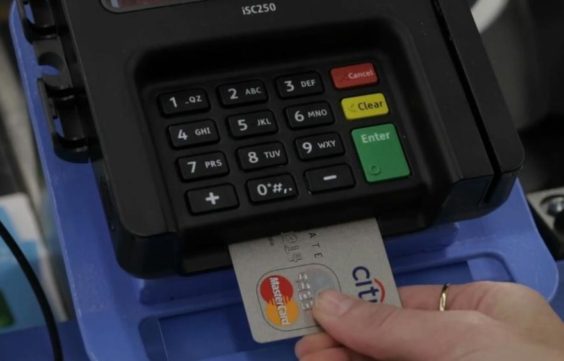
Many grocery stores brag about their ability to speed you through checkout. Your items sail over the scanner, they’re swiftly loaded into bags and your coupons scan without a hitch. The only thing left to do is pay, so you take out your credit or debit card…
And time and life as you know it come to a complete standstill.
If you have a new chip-enabled card, you’ve probably felt the pain of paying with plastic lately. So much for speedy checkout – by the time the machine reads your card, your ice cream has turned into a puddle and your bread is expired.
Okay, maybe it’s not that bad – but it sometimes seems like it. So now, some stores are trying to speed things up again. And one retailer not exactly known for speedy checkouts is among those leading the way.
Walmart says it’s been working to shave several all-important seconds off the increasingly lengthy checkout procedure. If you’re not familiar with the chip cards, or your stores are not yet equipped to accept them as intended, you have to insert your card into a slot instead of swiping it through the card reader. And then you have to wait. The card reader display will warn you not to remove the card as it reads the chip. So, with your bags already packed and your transaction just about complete, you’re left with little choice but to stare at the display until it tells you it’s okay to remove your card.
It’s all in the name of security. But what about convenience?
A study by JDA Software Group found that the new technology adds eight to 12 seconds to the typical checkout time. It doesn’t sound like much, but it can feel longer because you can’t spend the time multitasking like you used to. When all you have to do is swipe a card, you can while away the processing time by putting the card back in your wallet before you’re asked to sign. Then you sign and you can put your wallet away and gather your things as the transaction is approved. Then you’re handed your receipt, you’re on your way and you barely noticed the wait.
But with a chip card, after you insert it into the slot, most people aren’t inclined to look away and tend to other things, leaving their payment card sitting in the payment terminal unattended. And you can’t put away your wallet with the card still in the slot. So about all you can do is stare at the screen as the seconds begin to feel like minutes. Or weeks.
Walmart is trying to ease up on that wait time. The retailer says it’s managed to trim 11 seconds off its transaction time. The system no longer prompts you to confirm your purchase amount, for example, eliminating an unnecessary time-consuming step.
Visa, too, is upgrading its software to shave as many as 18 seconds off the chip-card transaction time. The company said Tuesday that its new and improved system will allow you to insert and remove your card in just two seconds, instead of inserting it and waiting and waiting. You’ll also be able to insert your card while the cashier is still ringing up your order, instead of standing there, card in hand, waiting for just the right moment.
But then there’s the matter of debit cards. Many retailers are no longer allowing chip-enabled debit card users to avoid entering a PIN. “You can no longer run your debit card as credit,” Kroger now informs its customers. “You’ll now be required to use your secure PIN to verify your transaction.”
“I’m seeing major pushback from the customers with whole carts being abandoned,” one anonymous Kroger employee posted on an online forum. “I don’t know about you, but I barely trust my bank to keep my PIN safe; I certainly don’t trust Kroger, H-E-B, Home Depot or anybody else.”
So things may not be more convenient for you, if you use a debit card and don’t want to stop to enter a PIN. If you use credit, though, relief is on the way. You may not mind spending hours sorting your coupons, going over your store’s circular and planning your shopping trip. But when it comes to speedy checkout, it seems, every second counts.
Image source: Walmart










